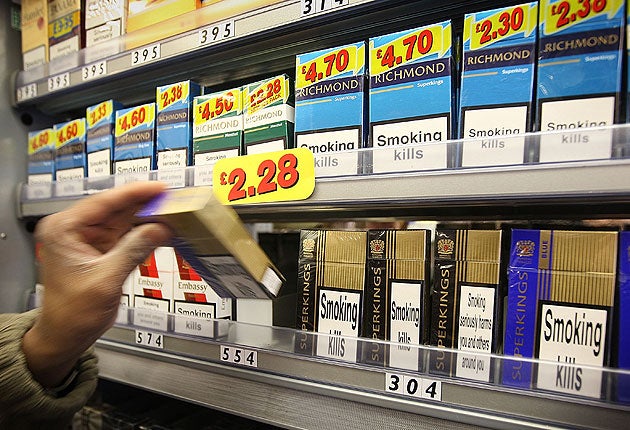Cigarette sales forced 'under the counter'

The Health Secretary today unveiled plans to force cigarette sales "under the counter" in an attempt to cut smoking by children.
Alan Johnson also announced that the Government was taking on powers to make it more difficult for under-18s to use cigarette vending machines - and may ban them if that does not work.
The move to ban prominent displays of tobacco products and advertising at the point of sale provoked storms of protest from shopkeepers, who argue it will cost them much-needed business during the economic crisis.
The Tobacco Manufacturers' Association warned that the change would hit corner shops hardest as customers buy more of their cigarettes from supermarkets. But Mr Johnson said that the ban will be introduced in supermarkets first, and that corner shop owners would anyway have to "diversify" as smoking rates fall.
The Health Secretary told BBC Radio 4's Today programme: "Any sane, rational and sensible Government will be focusing on removing what is the biggest public health risk."
Evidence from abroad shows that under-age smoking rates have been cut by as much as 10 per cent, while no retailers have been forced to close, said the Department of Health.
Mr Johnson said that the cost of changing shop layouts to accommodate the ban would not be "horrendous", citing evidence from Canada suggesting it came to about £500 a shop.
Official statistics show that almost 200,000 children aged between 11-15 were regular smokers in 2007.
And the "overwhelming majority" of the 100,000 responses to a consultation on the new measures backed a ban on point-of-sale displays as a good way of protecting these young people from the dangers of smoking.
Mr Johnson revealed that he had ditched a plan to ban the sale of cigarettes in packs of 10, which are thought to be within the range of pocket money purchasers. The consultation revealed concerns that this might erect a further obstacle for adults trying to cut down their intake.
He said: "This is primarily about children - 11 to 15-year-olds. Advertising has been removed from television, film and newspapers. The only point now where there is advertising is point-of-sale.
"Other countries have found when they banned point-of-sale displays, they reduced the number of young people taking up smoking.
"That is the primary concern we have here. Also, having these displays prompts impulse purchases and makes it more difficult for people who are determined to quit to actually quit."
In a written statement to Parliament today, Mr Johnson will promise a "fully inclusive" implementation across England with all possible help given to businesses to deal with any impact.
Vending machines, believed to be the source of cigarettes for up to a fifth of young smokers, will also face a ban or age-proofing measures such as a requirement to buy tokens for the machines rather than using cash.
And there will be a promise of more research on whether forcing cigarette firms to sell their products in plain packaging could further reduce the appeal to under 18s.
TMA director Chris Ogden told Today: "We are in the grip of a recession and it is hardly the time to knock small businesses by measures such as these.
"It is the retailers more than the manufacturers that are going to be hit by these proposals, and we feel a great deal of concern for them.
"They rely significantly on tobacco sales for their income and by losing sales to the bigger outlets, which is the inevitable result of this, they will also lose opportunity sales from smokers such as newspapers and chocolate bars."
He defended point-of-sale displays: "It is a legal product and it allows consumer choice and competition between manufacturers and retailers."
Mr Johnson said: "We will remove point-of-sale display from big supermarkets first."
But he warned that smaller shops will anyway not be able to rely on tobacco to provide a large slice of their income in future: "The number of people smoking is reducing and will continue to reduce so there needs to be diversification because that is going to happen remorselessly."
Prime Minister Gordon Brown told MPs last month that it was "not good enough" that smoking rates among children had only been cut from 13 per cent to 6 per cent.
The Government has already raised the age limit for buying tobacco from 16 to 18.
Subscribe to Independent Premium to bookmark this article
Want to bookmark your favourite articles and stories to read or reference later? Start your Independent Premium subscription today.

Join our commenting forum
Join thought-provoking conversations, follow other Independent readers and see their replies